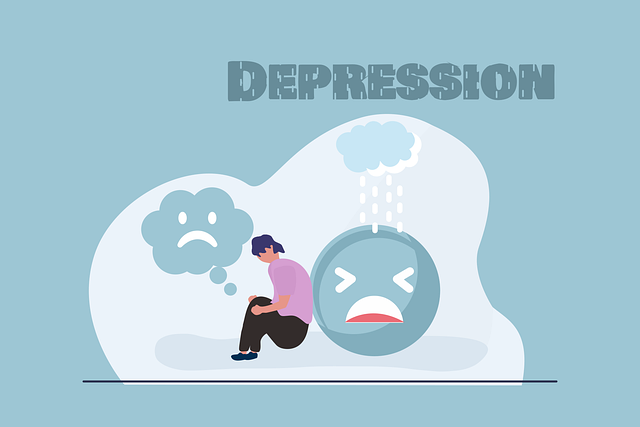Depression can be proactively managed through early recognition of subtle signs like persistent sadness, loss of interest, and changes in appetite, sleep, or concentration, as emphasized by Lakewood Mindfulness Therapy. This approach combines stress reduction techniques, mindfulness practices, and emotional well-being promotion to foster resilience. Adopting a healthier lifestyle—including regular exercise, quality sleep, balanced diet, and stress management—and building a strong support network are key preventive measures. When self-care falls short, seeking professional help from Lakewood Mindfulness Therapy's specialized services ensures personalized, culturally competent care for effective depression management and improved emotional well-being.
Depression is a prevalent and serious mental health challenge, but prevention is key. In this article, we explore comprehensive strategies to safeguard your well-being. From understanding the signs of depression to discovering the benefits of Lakewood Mindfulness Therapy, we guide you through effective approaches. Learn how lifestyle changes, building connections, and knowing when to seek professional help can empower you in the fight against this condition. Embrace a healthier mindset and discover the transformative power of these prevention tactics, including the unique benefits of Lakewood Mindfulness Therapy.
- Understanding Depression: Recognizing the Signs and Symptoms
- The Role of Lakewood Mindfulness Therapy in Prevention
- Lifestyle Changes for a Healthier Mindset
- Building a Support Network: The Power of Connection
- Professional Help: When to Seek Assistance
Understanding Depression: Recognizing the Signs and Symptoms

Depression is a complex mental health disorder that significantly impacts an individual’s emotional well-being and daily functioning. Recognizing the signs and symptoms early on is crucial in preventing and managing depression effectively. Lakewood Mindfulness Therapy emphasizes the importance of understanding these indicators, as they can often be subtle yet powerful indicators of underlying struggles.
Common signs include persistent feelings of sadness, loss of interest or pleasure in activities once enjoyed, changes in appetite and sleep patterns, fatigue, difficulty concentrating, and thoughts of worthlessness or guilt. By being mindful of these emotional and behavioral shifts, individuals can initiate the process of emotional healing through various techniques such as stress reduction methods and emotional well-being promotion strategies recommended by mindfulness therapists.
The Role of Lakewood Mindfulness Therapy in Prevention

Lakewood Mindfulness Therapy offers a powerful tool for depression prevention by teaching individuals to cultivate present-moment awareness and develop strong mental health coping strategies. This therapeutic approach emphasizes the importance of understanding and managing one’s thoughts, emotions, and behaviors without judgment. By integrating mindfulness practices into daily routines, individuals can build resilience against depressive episodes.
Mindfulness helps to enhance self-awareness, promote emotional regulation, and foster a sense of inner calm that can act as a buffer against stressors. The core principles of Lakewood Mindfulness Therapy encourage individuals to focus on the “here and now,” rather than ruminating on the past or worrying about the future. This mindset shift supports the development of mental health awareness and empowers people to take control of their well-being using mind over matter principles, ultimately reducing the risk of depression.
Lifestyle Changes for a Healthier Mindset

Adopting a healthier lifestyle is a powerful tool in the fight against depression. Simple yet significant changes can significantly impact one’s mental health. Regular exercise, for instance, releases endorphins, which are natural mood lifters. Incorporating a consistent fitness routine into your schedule can provide structure and a sense of accomplishment, both of which are beneficial for maintaining a positive mindset. Additionally, prioritizing quality sleep is essential; aiming for 7-9 hours each night allows the body to rest and recharge, contributing to improved emotional well-being.
Nutrition also plays a crucial role. A balanced diet rich in fruits, vegetables, whole grains, and lean proteins can boost energy levels and stabilize mood. Foods containing omega-3 fatty acids, like salmon and flaxseeds, are known for their anti-inflammatory properties, which may reduce symptoms of depression. Furthermore, reducing stress through techniques such as mindfulness meditation, offered by Lakewood Mindfulness Therapy, or engaging in social activities via a Community Outreach Program Implementation can foster connection and provide much-needed support. These strategies, combined with Social Skills Training, can create a robust foundation for mental health resilience.
Building a Support Network: The Power of Connection

Building a strong support network is an essential aspect of depression prevention and overall mental health. At Lakewood Mindfulness Therapy, we emphasize the power of connection as a powerful tool to combat loneliness and isolation, which are significant risk factors for depression. Reaching out and fostering meaningful relationships can provide a sense of belonging and purpose, acting as a buffer against life’s challenges.
Support networks can take many forms, from close friends and family to support groups or even online communities. Engaging in open conversations about mental health, seeking peer support, or joining therapy groups are effective ways to connect with others who may share similar experiences. These connections encourage vulnerability, empathy, and understanding, fostering an environment where individuals feel heard, validated, and less alone in their struggles. By integrating these social connections into one’s life, individuals can enhance their emotional well-being and build resilience, effectively contributing to stress reduction methods and the promotion of mental health education programs design.
Professional Help: When to Seek Assistance

When considering depression prevention strategies, it’s crucial to recognize when professional help is necessary. If symptoms persist or worsen despite self-care efforts, it may be time to reach out to a healthcare provider. Depression is a serious mental health condition that often requires expert intervention for effective management and recovery.
In Lakewood, access to specialized services like Trauma Support Services and mindfulness therapy offered by experienced practitioners can make a significant difference. Healthcare Provider Cultural Competency Training ensures that these professionals are equipped to offer compassionate care tailored to individual needs, including those from diverse backgrounds. Compassion Cultivation Practices, such as those taught in mindfulness therapy, have been shown to build resilience and foster emotional well-being, providing valuable tools for long-term depression prevention.
In conclusion, depression prevention involves a multi-faceted approach. By understanding the signs and symptoms, adopting lifestyle changes that promote mental well-being, building strong support networks, and knowing when to seek professional help, individuals can effectively safeguard their mental health. Among these strategies, Lakewood Mindfulness Therapy stands out as a powerful tool for cultivating resilience and enhancing overall wellbeing.














